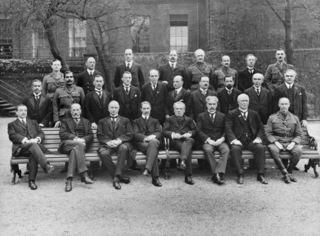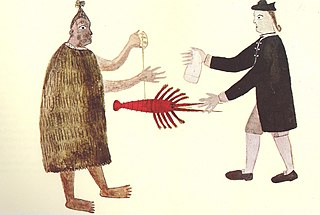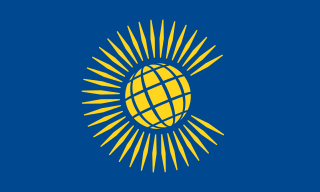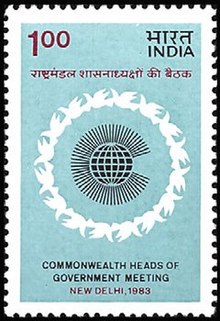
The Balfour Declaration of 1926, issued by the 1926 Imperial Conference of British Empire leaders in London, was named after Arthur Balfour, who was Lord President of the Council. It declared the United Kingdom and the Dominions to be:
... autonomous Communities within the British Empire, equal in status, in no way subordinate one to another in any aspect of their domestic or external affairs, though united by a common allegiance to the Crown, and freely associated as members of the British Commonwealth of Nations.
The Commonwealth Heads of Government Meeting is a biennial summit meeting of the governmental leaders from all Commonwealth nations. Despite the name, the head of state may be present in the meeting instead of the head of government, especially among semi-presidential states. Every two years the meeting is held in a different member state and is chaired by that nation's respective prime minister or president, who becomes the Commonwealth Chair-in-Office until the next meeting. Queen Elizabeth II, who was the Head of the Commonwealth, attended every CHOGM beginning with Ottawa in 1973 until Perth in 2011, although her formal participation only began in 1997. She was represented by the Prince of Wales at the 2013 meeting as the 87-year-old monarch was curtailing long-distance travel. The Queen attended the 2015 summit in Malta and the 2018 summit in London, but was represented again by the Prince of Wales at the 2022 meeting in Rwanda.

Imperial Conferences were periodic gatherings of government leaders from the self-governing colonies and dominions of the British Empire between 1887 and 1937, before the establishment of regular Meetings of Commonwealth Prime Ministers in 1944. They were held in 1887, 1894, 1897, 1902, 1907, 1911, 1921, 1923, 1926, 1930, 1932 and 1937.

Governor-general, or governor general, is the title of an office-holder. In the context of governors-general and former British colonies, governors-general are appointed as viceroy to represent the monarch of a personal union in any sovereign state over which the monarch does not normally reign in person. Governors-general have also previously been appointed in respect of major colonial states or other territories held by either a monarchy or republic, such as Japan in Korea and Taiwan and France in Indochina.

A Commonwealth realm is one of a group of sovereign states within the Commonwealth of Nations that have the same person, currently King Charles III, as their monarch and head of state. All the realms are independent of each other, although one person, resident in the United Kingdom, acts as monarch of each. Except for the UK, in each of the realms the monarch is represented by a governor-general. The phrase Commonwealth realm is an informal description not used in any law.

The Dominion of New Zealand was the historical successor to the Colony of New Zealand. It was a constitutional monarchy with a high level of self-government within the British Empire.

The Imperial War Cabinet (IWC) was the British Empire's wartime coordinating body. It met over three sessions, the first from 20 March to 2 May 1917, the second from 11 June to late July 1918, and the third from 20 or 25 November 1918 to early January 1919. Consisting of representatives from Canada, Australia, India, the Dominion of Newfoundland, New Zealand, South Africa, and the United Kingdom, the Cabinet considered many aspects of waging the First World War. It led to the United Kingdom's Dominions being considered more equal to Great Britain and Ireland. Held concurrently with the cabinet were the Imperial War Conferences of 1917 and 1918.

The Head of the Commonwealth is the ceremonial leader who symbolises "the free association of independent member nations" of the Commonwealth of Nations, an intergovernmental organisation that currently comprises 56 sovereign states. There is no set term of office or term limit and the role itself has no constitutional relevance to any of the member states within the Commonwealth. The position is currently held by King Charles III. Head of the Commonwealth is also a title of the monarch of each of the Commonwealth realms according to the Royal Style and Titles Act.
Imperial Preference was a system of mutual tariff reduction enacted throughout the British Empire as well as the then British Commonwealth following the Ottawa Conference of 1932. As Commonwealth Preference, the proposal was later revived in regard to the members of the Commonwealth of Nations. Joseph Chamberlain, the powerful colonial secretary from 1895 until 1903, argued vigorously that Britain could compete with its growing industrial rivals and thus maintain Great Power status. The best way to do so would be to enhance internal trade inside the worldwide British Empire, with emphasis on the more developed areas — Australia, Canada, New Zealand, and South Africa — that had attracted large numbers of British settlers.

The independence of New Zealand is a matter of continued academic and social debate. New Zealand has no fixed date of independence from the United Kingdom; instead, political independence came about as a result of New Zealand's evolving constitutional status.

The London Declaration was a declaration issued by the 1949 Commonwealth Prime Ministers' Conference on the issue of India's continued membership of the Commonwealth of Nations, an association of independent states formerly part of the British Empire, after India's transition to a republican constitution.

In the Commonwealth of Nations, a high commissioner is the senior diplomat, generally ranking as an ambassador, in charge of the diplomatic mission of one Commonwealth government to another. Instead of an embassy, the diplomatic mission is generally called a high commission.
Australia is a constitutional monarchy whose Sovereign also serves as Monarch of the United Kingdom, New Zealand, Canada and eleven other former dependencies of the United Kingdom including Papua New Guinea, which was formerly a dependency of Australia. These countries operate as independent nations, and are known as Commonwealth realms. The history of the Australian monarchy has involved a shifting relationship with both the monarch and also the British government.

Zimbabwe and the Commonwealth of Nations have had a controversial and stormy diplomatic relationship. Zimbabwe is a former member of the Commonwealth, having withdrawn in 2003, and the issue of Zimbabwe has repeatedly taken centre stage in the Commonwealth, both since Zimbabwe's independence and as part of the British Empire.

Commonwealth Prime Ministers' Conferences were biennial meetings of Prime Ministers of the United Kingdom and the Dominion members of the British Commonwealth of Nations. Seventeen Commonwealth Prime Ministers' Conferences were held between 1944 and 1969. As well, the prime ministers met for a Commonwealth Economic Conference in 1952. These series of conferences were a continuation and regularisation of the earlier Imperial Conferences which had been held periodically from 1887 to 1937. Since 1971, Commonwealth Heads of Government Meetings have been held.

The Commonwealth of Nations, often simply referred to as the Commonwealth, is an international association of 56 member states, the vast majority of which are former territories of the British Empire from which it developed. They are connected through their use of the English language and historical-cultural ties. The chief institutions of the organisation are the Commonwealth Secretariat, which focuses on intergovernmental relations, and the Commonwealth Foundation, which focuses on non-governmental relations between member nations. Numerous organisations are associated with and operate within the Commonwealth. It is known colloquially as the British Commonwealth.

The 1923 Imperial Conference met in London in the autumn of 1923, the first attended by the new Irish Free State. While named the Imperial Economic Conference, the principal activity concerned the rights of the Dominions in regards to determining their own foreign policy.
A Dominion was any of several largely self-governing countries of the British Empire, once known collectively as the British Commonwealth of Nations. Progressing from colonies, their degrees of colonial self-governance increased unevenly over the late 19th century through the 1930s. Vestiges of empire lasted in some dominions well into the late 20th century. With the evolution of the British Empire following the 1945 conclusion of the Second World War into the modern Commonwealth of Nations, finalised in 1949, the dominions became independent states, either as Commonwealth republics or Commonwealth realms.

The majority of the countries of the Commonwealth of Nations, formerly known as the British Commonwealth, still criminalise sexual acts between consenting adults of the same sex and other forms of sexual orientation, gender identity and expression. Homosexual activity remains a criminal offence in 29 of the 56 sovereign states of the Commonwealth; and legal in only 27.

The 1949 Commonwealth Prime Ministers' Conference was the fourth meeting of the Heads of government of the Commonwealth of Nations. It was held in the United Kingdom in April 1949 and was hosted by that country's prime minister, Clement Attlee.















